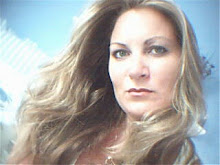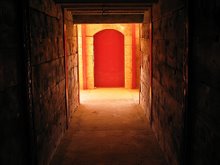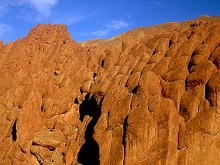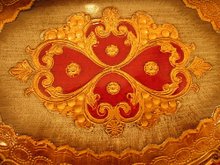 OURIKA VALLEY, MOROCCO -- March 28, 2006
OURIKA VALLEY, MOROCCO -- March 28, 2006I awake at 6:00 AM to the sound of the call to prayer being broadcast from the loudspeaker at the top of the Koutoubia Mosque's minaret. Koutoubia Mosque is the largest and grandest in Marrakech, and can be seen for miles, especially at night when it is lit like a decorative lighthouse rising above the cityscape.
I meet Monir at 9:00 and after a light breakfast of hohbs (Moroccan flatbread, much like a pita, but denser and larger) and freshly-squeezed jus d'orange, we proceed to the grande taxi stand, where we will wait until the taxi driver has collected his standard 6 for the ride into the valley of Ourika. I had read about this place before coming to Morocco, but listening to Monir tell me about it last night convinced me that it was worth a day trip to explore.
 After a lengthy wait and some bargaining for two Moroccan-priced fares (there is an unwritten rule that all tourists are charged more for everything). The taxi ride is cramped. There are three including the driver in the front seat, and four in the rear, in a car the size of your normal sedan. This is how public transporation works in Morocco.
After a lengthy wait and some bargaining for two Moroccan-priced fares (there is an unwritten rule that all tourists are charged more for everything). The taxi ride is cramped. There are three including the driver in the front seat, and four in the rear, in a car the size of your normal sedan. This is how public transporation works in Morocco.Our taxi continues down a long, dusty road before beginning its ascent into the winding mountains outside of Marrakech proper. The scenery is beautiful - bright, blue skies and ochre-colored cliffs, a smattering of foliage here and there. Less than an hour later, we are in Ourika.
We hike over rocky ledges upward, chasing the wind to the Cascade d'Ourika, a smallish yet tranquil waterfall. My sandals are no match for the challenging footholds from one rock to another, but I manage to make it to the base of the waterfall. We sit in the shade of the neighboring trees and munch on a handful of luz (almonds), which we purchased enroute from a meager snack stand. The salesman had wrapped our handful of luz in a piece of newspaper, and folded it up like the secret notes you pass during Algebra in high school.
 We splash the crystal clear stream water on our faces, arms, feet. It is cooling, a refreshment from the hot Moroccan sun. We wander along the dirt paths in the foothills of the mountains, passing small huts and homes, a multitude of sellers with their handcrafted wares for display. It is spring, and groves of apple trees are in full blossom, a welcome sign of new life.
We splash the crystal clear stream water on our faces, arms, feet. It is cooling, a refreshment from the hot Moroccan sun. We wander along the dirt paths in the foothills of the mountains, passing small huts and homes, a multitude of sellers with their handcrafted wares for display. It is spring, and groves of apple trees are in full blossom, a welcome sign of new life.We stop at a cafe tucked in the hillside, and I enjoy my very first tajine (in this case, potatoes, peas, olives, and a bit of succulent beef cooked in a clay pot over a hot flame). I love this Moroccan style of eating -- your fingers and a hand-torn piece of hobs are the only utensils you need. Sop the bread in the fragrant liquid simmering in the bottom of the clay pot. Mash a potato or bunch of peas between the bread you hold in your hand and the side of the dish. And, with a bit of skill, rotate your wrist as you raise the food to your mouth. I wash it down with a quasi-cold bottled drink. My fingers smell of onion and curry, and I am thoroughly satisfied.
We cross over rickety footbridges made of wooden planks, chicken wire, and strong twine. I think, one misplaced foot and I am eighteen inches deep in ice-cold stream water. I walk carefully. Soon it is time to head back to Marrakech. Monir hasinvited me to stay with his family, as a guest in their home, for the rest of my stay in Marrakech. I think, what a marvelous opportunity to throw off the shackles of "tourist travel" and really see the life of the Moroccan people. This is why I came, after all. Not for the sights or the food, or the extremely good sunshine (although they all were factors!). I came for the total experience.
 At 11:30 PM I am sitting in the focal point of the home of Monir's family. This room functions as both sleeping quarters for the whole family, and as the dining room. We sit on thin mattresses lying near to the ground, our legs crossed Indian style near a short, round table in the middle of the small room. Our sandals are left near the doorway, as this room is the only one with a covering over the bare concrete. Monir's mother finishes the last of the meal preparations over her kerosene burner, and I try to find some kind of commonality with Monir's brother Osama (15), sister Iptesam (24), and father Mahajoob. It's difficult, so I break out the Chinese checkers and battle a few rounds with my new friends.
At 11:30 PM I am sitting in the focal point of the home of Monir's family. This room functions as both sleeping quarters for the whole family, and as the dining room. We sit on thin mattresses lying near to the ground, our legs crossed Indian style near a short, round table in the middle of the small room. Our sandals are left near the doorway, as this room is the only one with a covering over the bare concrete. Monir's mother finishes the last of the meal preparations over her kerosene burner, and I try to find some kind of commonality with Monir's brother Osama (15), sister Iptesam (24), and father Mahajoob. It's difficult, so I break out the Chinese checkers and battle a few rounds with my new friends.Dinner time is always this late, and always served to the whole family together. It is part of an enduring legacy that I wish Americans had not become too busy to appreciate, and I am one guilty of the same. We sup over seasoned fish, a salad made of diced tomatoes, onions, and spices, and more than enough hobs to go around. It is an enjoyable ending to a scenic, relaxing, and utterly enjoyable day.
Plumbing is sparse -- Toureiya heats a kettle of boiling water for me to use for my evening dushe (Arabic for shower). The bathroom consists of a small, unfinished concrete chamber, one meter by two meters. The ceiling tapers low in the back, so much so that I can only stand upright just inside the door. The latch has been repaired by hand, but closing the door still leaves a one-inch gap visible from the main entry hall. There is a spigot for cold tap water, and to the rear, a squat-style toilet built into the ground. A large and small bucket stand ready for us, to sluice your business down the drain when you are finished. There are no provisions for toilet paper, but that's what your left hand is for, after all :)
I remind myself how absolutely spoiled I am to have spent nearly every morning of my life showering in a sparkling stall bigger than this bathroom, with hot water that runs right out of the tap. It is these simple pleasure that most of the world will never know.
~Melanie









No comments:
Post a Comment